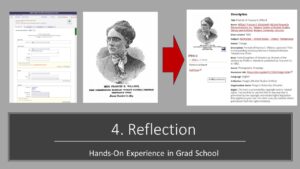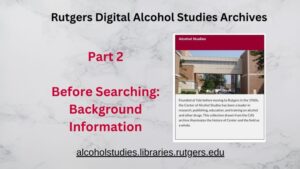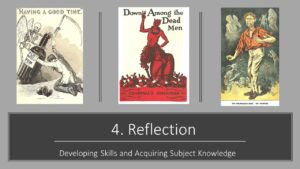The Rutgers Center of Alcohol Studies Digital Collection contains hundreds of images and documents drawn from the Center’s vast collections. Last semester, I uploaded a selection of digitized materials from the CAS Archives, including images and documents, to RUcore, the open access Rutgers University Community Repository. This was an important step in making these fascinating collections accessible to researchers everywhere.
I recently graduated from the Rutgers School of Communication and Information with a Master of Information, concentrating in Archives and Preservation. My concentration in the program included courses in digital curation, metadata, and cataloging. While I was a student, I had the opportunity to put the knowledge gained from these courses into practice working on the Alcohol Studies Digital Archive. In the archives world, we are frequently asked, “Why don’t you just put everything online?” I wish we could, but the reality is that this work is complicated and time-consuming. We do not have a way to automate the creation of item records, at least, not yet. First, someone needs to digitize the physical item, creating a virtual facsimile. This requires knowledge of how to safely handle old and fragile materials, how to operate the scanning equipment, and how to curate those digital files once you’ve created them. Next, somebody needs to look at each digital item, gather the relevant information about it (title, creator, date, and so on–we call this “metadata”), and put all that information up online. Consistency is key here. In order for users to successfully navigate the digital collections, we need to present information in a clear, standardized format.
These were the challenges we faced as we worked to get materials from the Alcohol Studies Archives up online and make them accessible to internal and external researchers. This project was truly a team effort, drawing upon the knowledge and skill sets of librarians, archivists, alcohol researchers, and information technology professionals. The resulting Digital Alcohol Studies Archive, hosted on RUcore, is a useful research tool that makes portions of the Center’s collections discoverable to researchers everywhere.
Researchers using the collections will have plenty to work with. The Center was founded at Yale in the early 1940s and moved to Rutgers in 1962. Over the course of its over eight decades of operation, the Center’s programs have served as forums for the exchange of ideas between alcohol researchers, medical professionals, and others involved in the broader discipline of alcohol studies. The records produced by these programs, and by individuals associated with the Center, are of considerable research value to modern scholars. Additionally, the Digital Archive contains historical images and documents related to the Temperance movement, which may be of interest to scholars studying that chapter of American history.
Our aim in digitizing the materials was to make them accessible to researchers everywhere, but not everyone will be familiar with how Rutgers resources are set up. For this reason, we decided to make an instructional video, walking users through the Alcohol Studies website and Digital Collections interface. We chose to make these tutorials available through the Alcohol Studies Research Guide, a centralized source of information for navigating the Alcohol Studies Archives.
In the beginning, we asked ourselves what would be the best way to break this topic down. Initially, we thought of doing one longer video. However, we ultimately decided to record it in four parts, so that users could focus on the parts of the interface or the collections that were most relevant to their needs and interests. Part 1 of the video tutorial provides a brief overview of the Center’s history. Part 2 is an introduction to the Alcohol Studies website, touching on the pages that cover notable people, publications, and special collections associated with the Center. Part 3 is a demo of the Digital Alcohol Studies Archives. As I narrate the video, I do a walkthrough of the platform, explaining the different features of the repository while performing an example search. Finally, Part 4 gives a closer look at item records within RUcore, highlighting the key pieces of information the records contain about each digitized object.
As I said, the making of this video was a team effort. I (Kate) wrote the script, which I then sent to Judit Ward for edits. After incorporating her feedback, I recorded the audio for the videos you see on the research guide. Splitting it up into the specific four parts was Judit’s idea. This decision allowed the content to “flow” better and made it a little easier to navigate. By breaking it down in parts, we made it so that users can find relevant information faster, without having to skip around in a longer video.
I recorded the demo portions myself, walking the viewer through the Alcohol Studies site and RUcore. I ran a demo search and opened a few example records, demonstrating how to interpret them. The actual putting-together of the four-part instructional video was done by Judit. She took my sound recordings, edited them, and added slides and images. At her suggestion, I re-recorded the demo portions, adjusting the view of the screen to minimize blank space and incorporating clearer gestures with the mouse as I spoke.
The end result of all of our work, our writing, recording, re-recording, editing, is a learning tool that will open up the Digital Alcohol Studies Archive to researchers within and outside of Rutgers. These valuable materials, long inaccessible, are now online for all to use and learn from, thanks to the efforts of the whole Alcohol Studies team. Happy searching!
Image Credit
Treasures in our Backyard see the recording of the presentation at the Rutgers SAPAC series, December, 2023)


